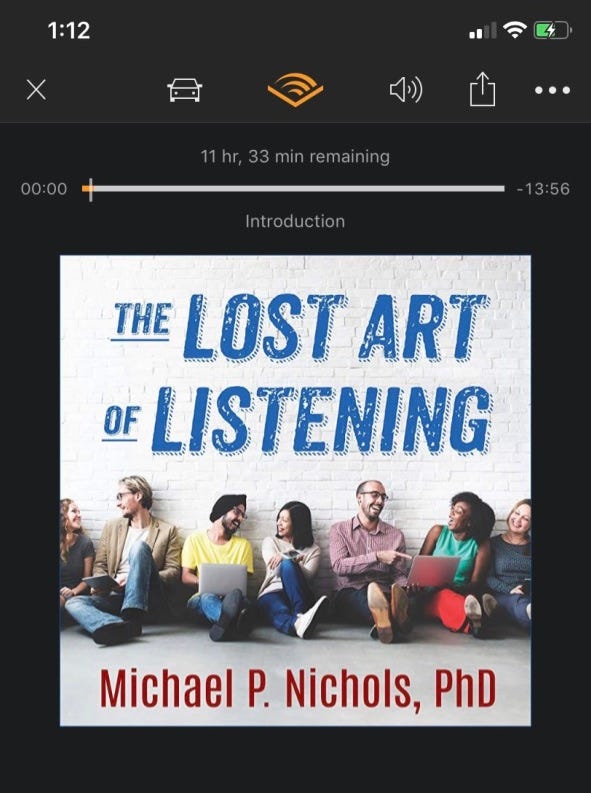The Lost Art of Listening by Michael P. Nichols

Communication is something that I’m very passionate about and love learning about. I believe that I can always communicate better with other people and love to learn new ways to do so. This was a wonderful book and provided so many valuable things that I was able to implement fairly quickly. Beyond that, I was able to become dramatically more conscious of the way that conversations happened and how they impacted the parties involved.
The beginning was something that made me think. The author wrote about empathy and what it truly means to be empathetic. I’ve heard the expression from my uncle, “You don’t truly love someone until their priority becomes greater than your own.” It was interesting to see that same idea translated into a conversation.
Sharing your experience is not the same as empathy, empathetic takes one person to talk and one to listen.
As I continued the book, there were some great reflective questions that I would challenge everyone to take a few minutes and try to answer. If you think hard enough, I guarantee you that you can answer each of these questions. Here are the 6:
1. Who is the best listener you know and why?
2. What do you hesitate to talk to your partner about and why, what happens to those withheld thoughts and feelings? What are the consequences?
3. If you improve the way you listen, who would you want to notice?
4. If people think you aren’t listening to them, what will they assume it means? What will this lead to?
5. If people think you are listening to them. What will they assume it means? What will this lead to?
6. The next time something is really bothering you notice how you feel about wanting to talk to someone. Does something hold you back? What are you worried about? If you do share your feelings with someone, what happens?
There was a story within the book that the author shared. It had to do with two brothers and the way that one misunderstood the other. I talk about it often but I do not believe that I can overstate the importance of establishing expectations. Because the brother who was listening thought that he knew what his brother needed, he did not listen closely enough.
What happened was one brother called the other, he needed someone to talk to. So, he shared his feelings with his brother who said something along the lines of, “Ohhh, okay,” and then changed the conversation’s topic. Even simply asking the question of, “Are you okay?” could have dramatically changed the outcome.
He was upset and needed someone to talk to. His brother said he had never seen him as someone who needs emotional support. He felt his brother was unsympathetic and didn’t hear what he said.

Most people agree with this, some may even add politics or their in-laws. But, while the content is important, it is not the most important. I’ve written an article previously about the 7–38–55 rule of communication.
The words that are actually expressed are only a small part of overall communication. I am sure we have all had conversations where we’re thinking, “Really… you had to bring that up NOW?” While there may never be a good time, the location and the reason for sharing something can be controlled.
Topics likely to be toxic among couples are children, money, and sex. What matters most is the way that things are communicated as well as where, when, and why something is said.
As a listener, two things happen. Oftentimes, I believe that we focus heavily on the first part — the report — and neglect the second part. While there may be something that someone says that is saddening, what is the command. Maybe, check back up on them in a couple of days and see how they’re doing?
All communication has two levels of meaning: report and command. The report or message is the information conveyed by words. Command conveys how the report is to be taken.
Again, what matters most is the way that things are communicated as well as where, when, and why something is said. It’s easy to completely misinterpret a message from someone if they cannot use tonality or physical expressions. The author shares another short story about a couple who looks to communicate with each other while they are apart.
Messages may get sent in a different frame of mind than they are read in Example: Long distance boyfriend texts his girlfriend good morning, she’s at work and doesn’t respond. Later, he messages her again about a specific question. She responds to just the question and nothing else. He says that he is hurt she did not say good morning. What the message didn’t convey was that he misses her.
The following was one of the most important takeaways from the book for me. While there are often many things that we can do while listening, the following 2 things are more important than all else. Often, I see people thinking that they are simply too busy. Too busy for what? Too busy to listen to what the speaker is trying to say to you? We saw that portrayed in an earlier part of the book. One brother thought he knew the reason that his brother shared something with him. Really though, he was in a point of distress and was seeking comfort and guidance in his brother.
LISTEN FOR IMPLICIT FEELINGS IN WHAT PEOPLE SAY
1. Appreciate the other person’s perspective.
2. Clarify what remains implicit Context — is this a good time? Where you are, time, place, who’s there, what their expectations are. People often have different preferred times to talk.

Listening is not something that we can do on our own terms.
The golden rule states, “Treat others the way you want to be treated.”
The platinum rule states, “Treat others the way they want to be treated.”
“We must suspend our own interests when listening.” — Michael P. Nichols
I feel like people don’t always realize what they say. Or if they do, they don’t always realize the effect that they’re words have on someone else. As I noted below, there are 5 ways that we generally respond to someone when they express some level of distress to us. When we think we might be empathetic and say, “Oh how awful.” We’re really closing the conversation, what type of response are we to provide to that?
When someone says something along the lines of, “Oh how awful, the attention shifts to the listener as though they are worried.”
The audiobook went into detail about the 5 ways that people typically respond to periods of distress from other people. If you start to think about it, you’ll be able to become aware of the way that you are responding. Which is natural and which requires more intentionality? Think it’s hard to determine which response you’re giving? Just look at the way that people respond to you as a result.
For each of the following comments, determine what you normally say, not what you think you should say.
1. Advice
2. Criticism
3. Empathetic that closes conversation
4. Empathetic that opens conversation
5. Taking about yourself
This is something that often takes a little bit of repetition to fully understand. Just because we know something does not mean that we can assume the person we’re talking to has heard the same thing. This has been a consistent challenge for me but one that I am continuing to improve upon in the goal of making my communication, and relationships, better.
We don’t know what people hear on the inside, what they’ve heard time and time again from others.
Wow. Read this 100 times. And then, take it to heart. How much more does something resonate with us when it is said in the way that we can best understand it? Isn’t it so much more important that someone is considerate of us? Especially if it is something that is difficult for us to hear?
It’s the way hard things get said that determines whether or not they get heard.
The other person may feel attacked if you express yourself in an action or pressured manner.
It’s really simple. In a relationship, we care about the other person, so we should undoubtedly exemplify that care through our conversations as well.
Better listening doesn’t start with a set of techniques, it starts with making a sincere effort to what’s going on in the other person’s private world of experience
Empathy means we take the next step. Let’s really practice empathy. Empathy is defined as, “Empathy is the capacity to understand or feel what another person is experiencing from within their frame of reference, that is, the capacity to place oneself in another’s position.” Here’s what the author said:
Empathetic openness means understanding what things look like in that person’s world.
Someone who is generous gives without expectation. Why shouldn’t we do the same thing when communicating with others? We are responsible for us. Likewise, we should take responsibility for something that we are a major part of — like a conversation with someone else.
Most assumptions about why communication breaks down are about the other person.
In closing, there were a lot of great points from this book but one that kept reappearing — at least to me — was the importance of expectations. People need to be on the same page for effective communication, and listening, to take place.
Expectations about when communication should take place work not when they’re right or wrong but when they’re shared.

Within the book there were a lot of great little quizzes and questions for readers. Things like, “which response would you give?” amongst other things made the experience of the book that much better for me. I chose this initially with the intention to learn as much as I could. I cannot overemphasize the importance of effective communication. While I learned plenty from this wonderful book, I know that effective communication is a lifelong growth journey and it requires me to consistently be considerate of the other people that I’m communicating with.
I gave this book a 4.5/5